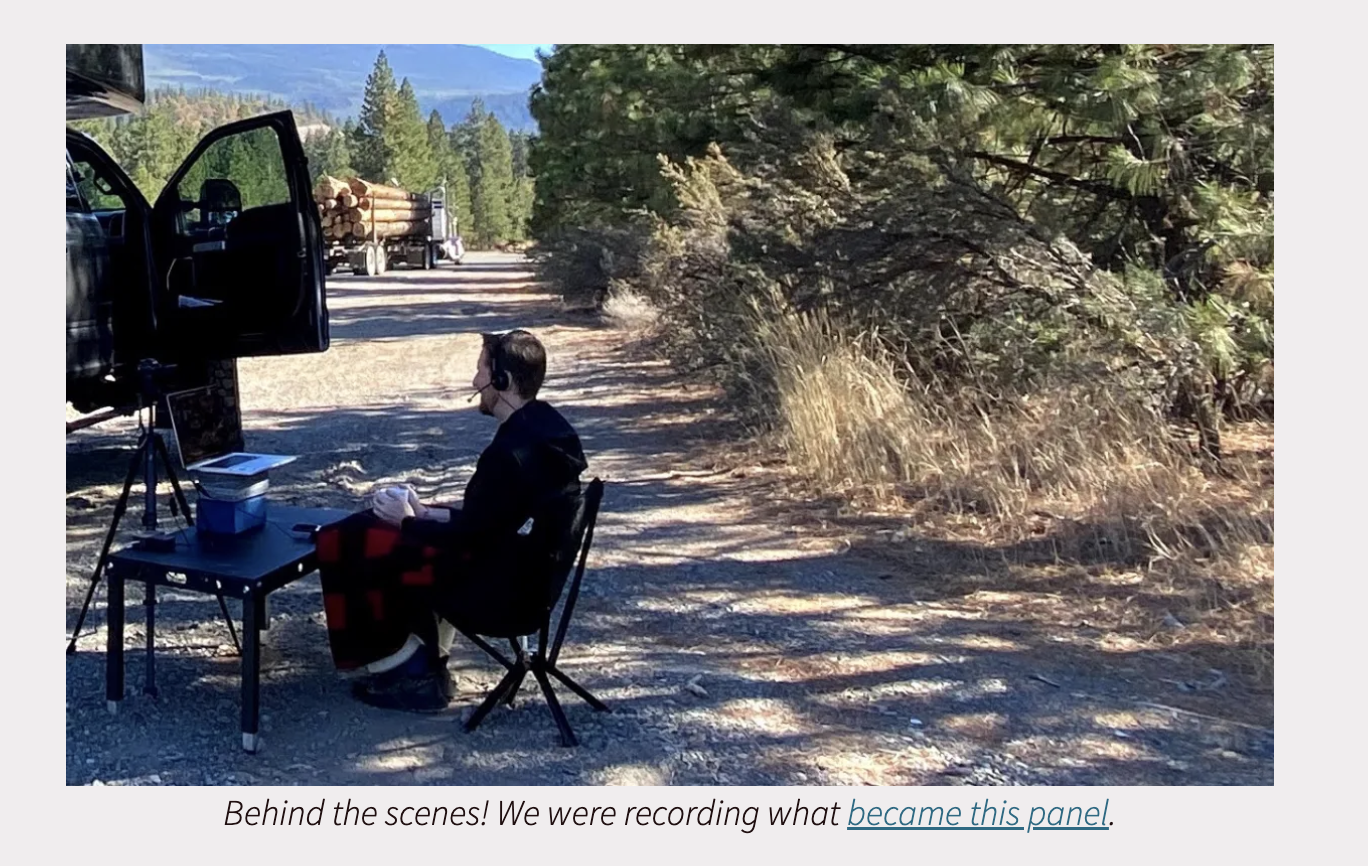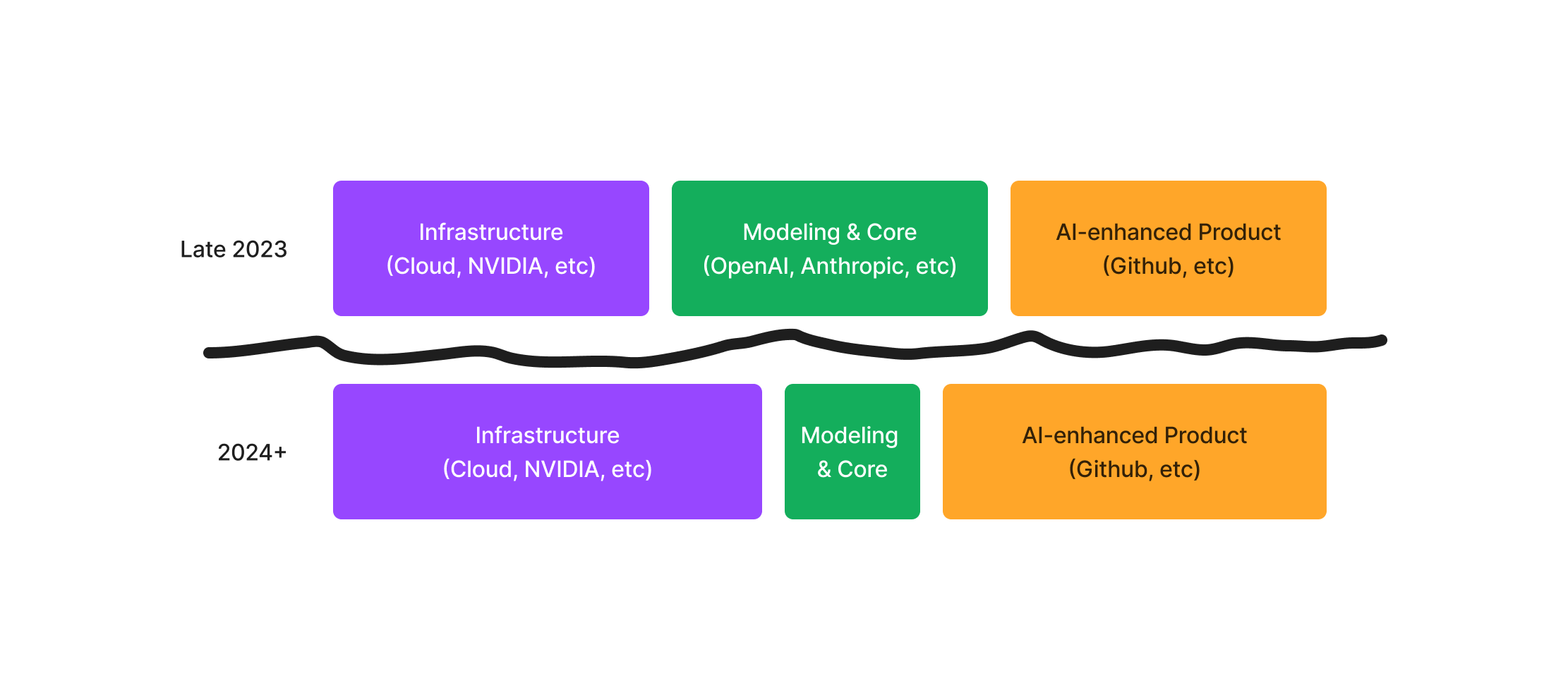Matt Mullenweg
Matt co-founded WordPress which powers about 1/3 of the entire internet, and then later created Automattic which is the for-profit company he describes as a "Digital Berkshire Berkshire" buying up companies like Tumblr and many others.
Matt published his Thoughts on Tech Employment last week which contains a great nugget that I've been thinking about for ages:
"Tech-first companies are going to become leaner and more leveraged. Fewer people are going to create more value for society, in ways that will follow power laws and I think we should investigate things like Universal Basic Income to provide for all living beings. Technological progress creates abundance, where we have more than what we need."
I’ve been fascinated by Automattic for a longtime. WordPress was the first web technology that I really leveraged and built on top of. It wasn’t until Dan Abramov's mother of all demos came along that I took React seriously and decided to shift away from WordPress.
Automattic is a fully remote company (Matt will call it "distributed"). I’ve always kept an eye on companies like Automattic, Linear, Zapier, GitLab which will sometimes write about how they make a fully remote organisation work. If there’s anything these companies have in common is that they make software that makes software. The ability to be able to dogfood your own product and see if it’s able to increase the productivity of your own remote organisation must be pretty incredible.
Like all good organisations, Automattic has some cult-like culture. Exhibit A: The Automattic Creed:
"I will never stop learning. I won’t just work on things that are assigned to me. I know there’s no such thing as a status quo. I will build our business sustainably through passionate and loyal customers. I will never pass up an opportunity to help out a colleague, and I’ll remember the days before I knew everything. I am more motivated by impact than money, and I know that Open Source is one of the most powerful ideas of our generation. I will communicate as much as possible, because it’s the oxygen of a distributed company. I am in a marathon, not a sprint, and no matter how far away the goal is, the only way to get there is by putting one foot in front of another every day. Given time, there is no problem that’s insurmountable.
In an era of Return To Office culture Matt's 5 Levels of Remote Work is such a different view, and was later covered by the NY Times:
Level four is when things go truly asynchronous. You evaluate people’s work on what they produce, not how or when they produce it. Trust emerges as the glue that holds the entire operation together. You begin shifting to better — perhaps slower, but more deliberate — decision-making, and you empower everyone, not just the loudest or most extroverted, to weigh in on major conversations. You tap into the global talent pool, the 99% of the world’s population and intelligence that doesn’t live near one of your legacy physical office locations. Employee retention goes way up, and you invest more in training and coaching. Most employees have home-office setups that would make office workers green with envy. You have a rich social life with people you choose.
Matt loves to blog openly about remote working setups. If I asked you to picture an influential CEO giving a meeting you might think sharp suit, in the boardroom of an expensive shiny steel office building. Jeremy Irons in Margin Call comes to mind:

You probably wouldn't think of this setup on the side of the road:

The future is weird. I love it.
More on Matt:
Royal Society of Arts in London
How I Built This (listen on Pocket Casts)
The UK's Kleptocracy problem
I came across this long-read in the New Yorker which linked out to Butler to the World: The Book the Oligarchs Don't Want You to Read - How Britain Helps the World's Worst People Launder Money, Commit Crimes, and Get Away with Anything and The UK's Kleptocracy problem.
The world is awful. The world is much better. The world can be much better
Dan Abramov on React, RSCs, and the future
Dan also tweeted about an interesting new paper about decentralised social network architecture in collaboration with Martin Klepmann.
Read, Write, Own
Molly White Review: Chris Dixon's Read Write Own.
I love local-first software. I don't love having to give all my data to a for-profit organisation and take their word for it that it's looked after. I don't love that we've sort of "accepted" that this is just the way it is.
I hope we find solutions, I hope that there's genuine decentralised projects like what Dan is working at Bluesky that leverage decentralised technologies and have better UX than the products we have today.
I hope the crypto bubble bursting flushed out the grifting and rug-pulling, but I doubt it.
Thesis on value accumulation in AI.

"AI-enhanced product has relatively few sophisticated entries today. There’s a lot of handwaving and loud statements, but very few companies that have proven out their AI-enhanced products are meaningfully better than preexisting alternatives. I think this is a matter of time rather than exceptionally difficult, so we will see more value accumulate here."
Techcrunch Plus Termination
I haven't read much TechCrunch since I was in high-school but I look back at it fondly. It helped give me a fraction of an idea of what was going on in Silicon Valley.
This article goes behind the scenes of what running the site was like:
As one of the most venerable sites covering tech on the web, major announcements from Elon Musk, Tesla, Apple, Facebook and other big technology companies drove heavy traffic to TechCrunch. Most of this was relayed via Google Search and Google News, and at times, more than 90% of the site’s traffic came from just those two sources. Critically, this coverage was eminently affordable. Writing up an article on the latest ravings of Elon Musk might take about 15 minutes (there usually wasn’t that much to say other than his statement, after all), but that one article could drive 100,000 page views or more. That was the secret treasure that funded the real in-depth reporting: cheap coverage of a big tech company coupled with the lucre of comparatively extraordinary ad revenue.
Lux Capital - TechCrunch Plus Termination
Gemini
Bard is now Gemini.
LLM Self Hosting is easy now
There's this old video of a 21 year old Zuckerberg from 2005 giving a lecture to a fairly empty lecture hall in Harvard detailing how was using the open-source technologies that powered web applications at the time - Linux, Apache, MySQL, PHP (LAMP) and Java Applets.
Entrepreneurs building on top of open source has been the default for a longtime.
It's not yet clear if the AI wave will win open-source vs closed.
Tools that make self-hosting models easier are coming.
Sama is making a chip
Cloudflare defeats patent troll
"When it was our turn, we told the jury our story. How Cloudflare was founded to help build a better Internet by moving past old, hardware-based solutions to new, cloud-based solutions delivered through our global network. We explained the hard work put into building our network, and all the services that sit on top of it. One of our outstanding engineers described what it’s like to create a new product, working with teams of engineers, product managers, and others to bring something exciting to the market for the first time…
During closing arguments, Cloudflare’s trial lawyer made one thing clear–this case was about more than Sable or Cloudflare. The patent system was designed to foster innovation and promote the progress of science, but what Sable was doing was exactly the opposite: bringing meritless cases in an effort to turn a buck, and stifling progress in the process. That distortion and abuse of the patent system has to stop and, ultimately, only the jury had the power to end it."
